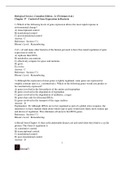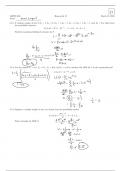-
1. Exam (elaborations) - Biological science 2ed-canada by scott freeman ch55-biodiversity and conservation bio...
-
2. Exam (elaborations) - Biological science 2ed-canada by scott freeman ch54-ecosystems
-
3. Exam (elaborations) - Biological science 2ed-canada by scott freeman ch53-community ecology
-
4. Exam (elaborations) - Biological science 2ed-canada by scott freeman ch52-population ecology
-
5. Exam (elaborations) - Biological science 2ed-canada by scott freeman ch51-behavioural ecology
-
6. Exam (elaborations) - Biological science 2ed-canada by scott freeman ch50-an introduction to ecology.
-
7. Exam (elaborations) - Biological science 2ed-canada by scott freeman ch49-the immune system in animals
-
8. Exam (elaborations) - Biological science 2ed-canada by scott freeman ch48-animal reproduction
-
9. Exam (elaborations) - Biological science 2ed-canada by scott freeman ch47-chemical signals in animals
-
10. Exam (elaborations) - Biological science 2ed-canada by scott freeman ch46-animal sensory systems and moveme...
-
11. Exam (elaborations) - Biological science 2ed-canada by scott freeman ch45-electrical signals in animals.
-
12. Exam (elaborations) - Biological science 2ed-canada by scott freeman ch44-gas exchange and circulation
-
13. Exam (elaborations) - Biological science 2ed-canada by scott freeman ch43-animal nutrition
-
14. Exam (elaborations) - Biological science 2ed-canada by scott freeman ch42-water and electrolyte balance in ...
-
15. Exam (elaborations) - Biological science 2ed-canada by scott freeman ch41-animal form and function
-
16. Exam (elaborations) - Iological science 2ed-canada by scott freeman ch40-plant reproduction
-
17. Exam (elaborations) - Biological science 2ed-canada by scott freeman ch39-plant sensory systems, signals, a...
-
18. Exam (elaborations) - Biological science 2ed-canada by scott freeman ch38-plant nutrition
-
19. Exam (elaborations) - Biological science 2ed-canada by scott freeman ch37-water and sugar transport in plan...
-
20. Exam (elaborations) - Biological science 2ed-canada by scott freeman ch36-plant form and function
-
21. Exam (elaborations) - Biological science 2ed-canada by scott freeman ch35-viruses
-
22. Exam (elaborations) - Biological science 2ed-canada by scott freeman ch34-deuterostome animals
-
23. Exam (elaborations) - Biological science 2ed-canada by scott freeman ch33-protostome animals
-
24. Exam (elaborations) - Biological science 2ed-canada by scott freeman ch32-an introduction to animals
-
25. Exam (elaborations) - Biological science 2ed-canada by scott freeman ch31-fungi.
-
26. Exam (elaborations) - Biological science 2ed-canada by scott freeman ch30-green algae and land plants
-
27. Exam (elaborations) - Iological science 2ed-canada by scott freeman ch29-protists
-
28. Exam (elaborations) - Biological science 2ed-canada by scott freeman ch28-bacteria and archaea
-
29. Exam (elaborations) - Biological science 2ed-canada by scott freeman ch27-phylogenies and the history of li...
-
30. Exam (elaborations) - Biological science 2ed-canada by scott freeman ch26-speciation
-
31. Exam (elaborations) - Biological science 2ed-canada by scott freeman ch25-evolutionary processes
-
32. Exam (elaborations) - Biological science 2ed-canada by scott freeman ch24-evolution by natural selection
-
33. Exam (elaborations) - Biological science 2ed-canada by scott freeman ch23-an introduction to plant developm...
-
34. Exam (elaborations) - Biological science 2ed-canada by scott freeman ch22-an introduction to animal develop...
-
35. Exam (elaborations) - Biological science 2ed-canada by scott freeman ch22-an introduction to animal develop...
-
36. Exam (elaborations) - Biological science 2ed-canada by scott freeman ch21-principles of development
-
37. Exam (elaborations) - Biological science 2ed-canada by scott freeman ch20-genomics
-
38. Exam (elaborations) - Biological science 2ed-canada by scott freeman ch19-analyzing and engineering genes
-
39. Exam (elaborations) - Biological science 2ed-canada by scott freeman ch18-control of gene expression in euk...
-
40. Exam (elaborations) - Biological science 2ed-canada by scott freeman ch17-control of gene expression in bac...
-
41. Exam (elaborations) - Biological science 2ed-canada by scott freeman ch16-transcription, rna processing, an...
-
42. Exam (elaborations) - Biological science 2ed-canada by scott freeman ch15-how genes work
-
43. Exam (elaborations) - Biological science 2ed-canada by scott freeman ch13-mendel and the gene.
-
44. Exam (elaborations) - Iological science 2ed-canada by scott freeman ch12-meiosis.
-
45. Exam (elaborations) - Biological science 2ed-canada by scott freeman ch11-the cell cycle
-
46. Exam (elaborations) - Biological science 2ed-canada by scott freeman ch10-photosynthesis.
-
47. Exam (elaborations) - Biological science 2ed-canada by scott freeman ch09-cellular respiration and fermenta...
-
48. Exam (elaborations) - Biological science 2ed-canada by scott freeman ch08-cell-cell interactions.
-
49. Exam (elaborations) - Biological science 2ed-canada by scott freeman ch07-inside the cell.
-
50. Exam (elaborations) - Biological science 2ed-canada by scott freeman ch06-lipids, membranes, and the first ...
-
51. Exam (elaborations) - Biological science 2ed-canada by scott freeman ch05-an introduction to carbohydrates
-
52. Exam (elaborations) - Biological science 2ed-canada by scott freeman ch04-nucleic acids and the rna world.
-
53. Exam (elaborations) - Biological science 2ed-canada by scott freeman ch04-nucleic acids and the rna worl
-
54. Exam (elaborations) - Biological science 2ed-canada by scott freeman ch04-nucleic acids and the rna worl
-
55. Exam (elaborations) - Biological science 2ed-canada by scott freeman ch03-protein structure and function
-
56. Exam (elaborations) - Biological science 2ed-canada by scott freeman ch03-protein structure and function
-
57. Exam (elaborations) - Biological science 2ed-canada by scott freeman ch02-water and carbon the chemical bas...
-
58. Exam (elaborations) - Biological science 2ed-canada by scott freeman ch01-biology and the tree of life
-
Show more





